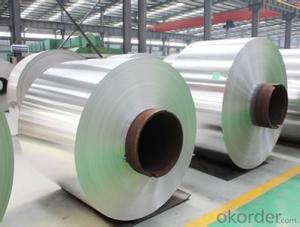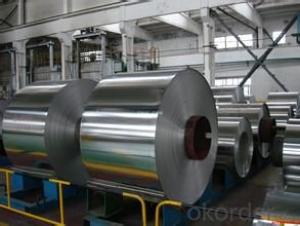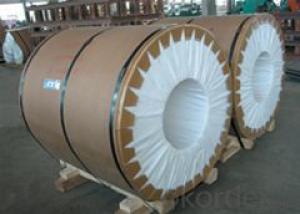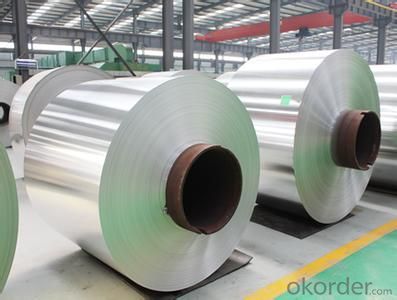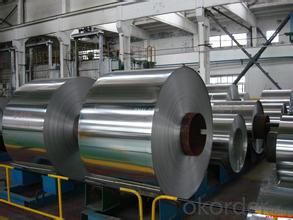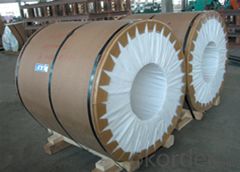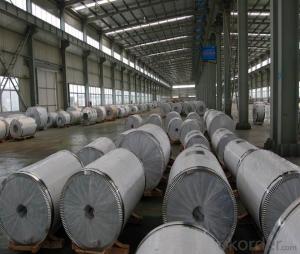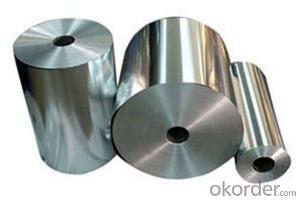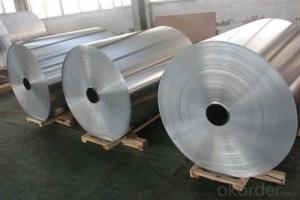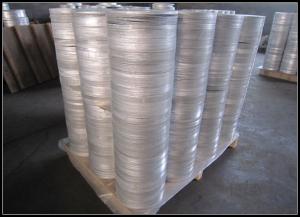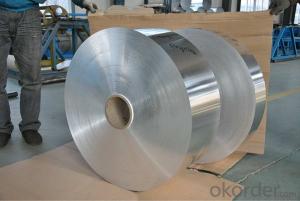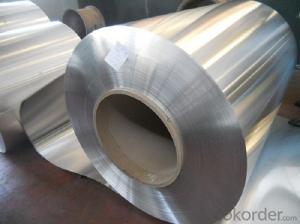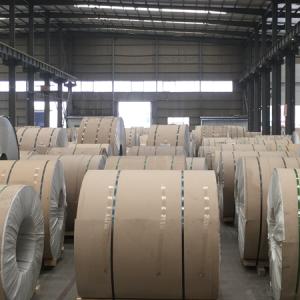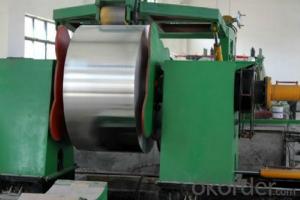Gpc143041 All Aluminum Coil - Aluminum Coil Strip 5052 H32
- Loading Port:
- Shanghai
- Payment Terms:
- TT OR LC
- Min Order Qty:
- 5 m.t.
- Supply Capability:
- 100000 m.t./month
OKorder Service Pledge
OKorder Financial Service
You Might Also Like
Specification
1.Structure of Aluminum Coil Strip 5052 H32 :
Mill Finished Aluminum Coil is designed for many field such as electronics, instruments, lighting decoration, packing industry, and house decoration, curtain wall, honeycomb-core panel, sandwich panel, aluminum composite panel, aluminum composite pipe etc.. Mill finished aluminum coil is hard and everlasting under the blazing sun. You can choose the alloys as your habitation and we will do our best to meet your requests.
2.Main Features of the Aluminum Coil Strip 5052 H32 :
• Smooth surface
• High manufacturing accuracy
• High strength of extension and yield
• Well packaged
• No marks, no scratch, no excessive oil
3. Aluminum Coil Strip 5052 H32
Alloy: | AA1050, 1060, 1070, 1100, 3003, 3004, 3005, 3105, 5052, 5083, 5754, 8011, 8006 |
Temper: | H14, H16, H18, H22, H24, H26, H32, O/F |
Thickness: | 0.2-100mm |
Width: | 30mm-1700mm |
4. Production of Aluminum Coil Strip 5052 H32
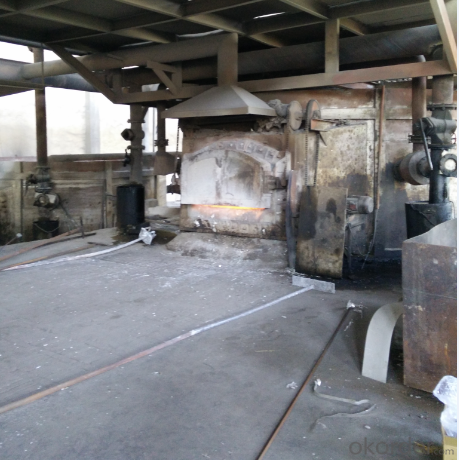
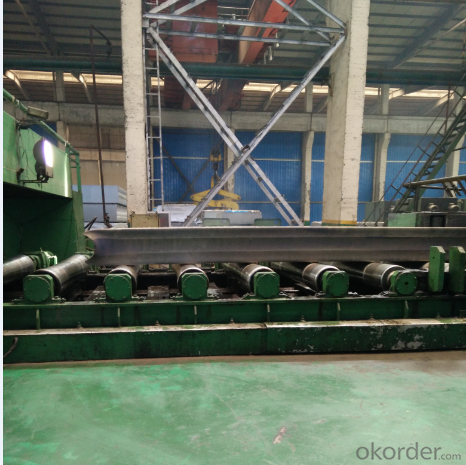
5.FAQ
We have organized several common questions for our clients,may help you sincerely:
① How about your company?
A world class manufacturer & supplier of aluminum coil and alloy blanks. Aluminum production base is comprised of 18 aluminum annealers, 10 coil and foil mills, 4 continuous production lines, 2 hot rolling production line and 3 prepainted lines.
Export 5000 tons per month to Asia, America and Middle East. Always do the best for our clients.
②Can you guarantee the quality of the products?
We are responsible for the quality of materials to get a long-term cooperation with clients in a reasonable period of time and we are glad to arrange and coordinate any third party inspection for you.
③What is the delivery time after purchase?
35 day after receiving client’s deposit or correct LC
- Q: Please tell me the the size of the piece of aluminum that you give the weight messurements.
- 2.7 grams per cubic centimeter at room temperature it's a 2.75 on the Moh's hardness scale. There is a ton of info on Aluminum available on wikipedia.
- Q: What is the profit of aluminium coil gate?
- Who will tell you? It depends on how much you sell
- Q: Can aluminum coils be used for outdoor applications?
- Yes, aluminum coils can be used for outdoor applications. Aluminum is a highly versatile and durable material that can withstand various weather conditions and temperatures. It is resistant to corrosion, making it suitable for outdoor environments where moisture and humidity are present. Additionally, aluminum coils are lightweight, which makes them easier to transport and install in outdoor settings. They are commonly used in outdoor applications such as roofing, siding, gutters, and HVAC systems. Overall, aluminum coils are a reliable choice for outdoor applications due to their strength, corrosion resistance, and longevity.
- Q: Can aluminum coils be used in agricultural applications?
- Aluminum coils are suitable for agricultural applications. They offer numerous benefits for agricultural purposes due to their versatility and lightweight nature. In the agricultural industry, aluminum coils are commonly utilized in greenhouse frames, irrigation systems, and grain storage bins. The resistance to corrosion is one of the key advantages of aluminum coils in agricultural applications. Aluminum is naturally resistant to rust and can withstand exposure to moisture, chemicals, and other elements commonly found in agricultural environments. As a result, it is a durable and long-lasting choice for agricultural equipment that needs to endure harsh conditions. Moreover, aluminum coils have excellent thermal conductivity, allowing them to efficiently transfer heat. This property makes them ideal for heat exchangers, which are frequently used in agricultural machinery like tractors and combine harvesters. Efficient heat transfer helps maintain optimal operating temperatures and enhances overall equipment performance. Additionally, the lightweight nature of aluminum coils makes them easy to handle and transport. This is particularly advantageous in agricultural applications where equipment needs to be frequently moved, such as portable irrigation systems or lightweight structures. The lightweight nature of aluminum also aids in reducing fuel consumption in machinery, leading to cost savings and environmental benefits. Furthermore, aluminum is a non-toxic material, ensuring its safety in agricultural applications. It does not release any harmful chemicals or leach into the soil, thus keeping crops uncontaminated and safe for consumption. In conclusion, aluminum coils are a reliable and efficient choice for various agricultural equipment and structures. Their corrosion resistance, thermal conductivity, lightweight nature, and non-toxic properties contribute to increased productivity and sustainability in the agricultural industry.
- Q: The export of aluminum coil, according to steel coil declaration, will there be any problems?
- If you have already declared itCheck the corresponding HS code, to import countries taxes and fees are the same, whether the customer side mind?.China's tax rebate rate, you also see what kind of high?.In addition to export will have a steel coil sampling, aluminum volume difference is relatively large, so if the declaration, to take note of this, if the sampling try with conversational communication forwarding, otherwise it would be a big problem.
- Q: What are the various dimensions and specifications of aluminum coils available in the market?
- <p>Aluminum coils come in various sizes and specifications to cater to different industrial needs. Common sizes include thicknesses ranging from 0.005 to 0.5 inches (0.13 to 12.7 mm), widths from 1 to 72 inches (25 to 1829 mm), and lengths from 10 to 6000 feet (3 to 1829 meters). The specific dimensions can vary based on the manufacturer and the application, such as construction, automotive, or packaging. It's important to consult with suppliers for the exact sizes available for a particular project or application.</p>
- Q: Can aluminum coils be used in the production of solar panels?
- Aluminum coils are indeed suitable for the production of solar panels. Being a lightweight and durable material, aluminum brings numerous advantages to the manufacturing process. Its high conductivity and exceptional thermal properties enable efficient dissipation of heat. Furthermore, aluminum exhibits resistance to corrosion, a vital characteristic for solar panels as they encounter diverse weather conditions. Moreover, the cost-effectiveness of aluminum makes it a favored option in the solar industry. By employing aluminum coils in solar panel production, the performance, durability, and cost-effectiveness of these panels are greatly improved.
- Q: How are aluminum coils stored in a warehouse?
- Aluminum coils are typically stored in a warehouse by stacking them vertically or horizontally, depending on the size and weight of the coils. They are often placed on pallets or racks to maximize storage space and ensure stability. Additionally, protective packaging materials, such as plastic or cardboard, may be used to prevent damage and maintain the integrity of the coils during storage.
- Q: Can aluminum coils be used for insulation purposes?
- No, aluminum coils cannot be used for insulation purposes. Aluminum is a good conductor of heat and electricity, which means it would actually transfer heat rather than insulate it. Insulation materials are typically chosen for their ability to resist heat flow and reduce energy transfer. Materials like fiberglass, foam, or mineral wool are commonly used for insulation purposes as they have low thermal conductivity and can effectively trap air pockets to reduce heat transfer.
- Q: Are there any limitations on the welding or soldering of aluminum coils?
- Welding or soldering aluminum coils comes with limitations. Aluminum is a reactive metal with a low melting point, making it more challenging to weld or solder compared to other metals. One limitation is the formation of oxide layers on the aluminum surface, which prevents strong bonding during the welding or soldering process. These oxide layers must be removed beforehand, either through chemical cleaning agents or mechanical methods like abrasive cleaning. Another limitation is aluminum's high thermal conductivity, which leads to rapid heat dissipation. This makes it difficult to reach and maintain the necessary temperature for welding or soldering. Overcoming this limitation may require specialized techniques and equipment, such as high-frequency welding or preheating the aluminum. Moreover, aluminum is prone to deformation or warping under high temperatures. This can cause distortion or changes in the coil's shape during welding or soldering. To minimize this, proper clamping or fixturing techniques are often necessary. Furthermore, using filler materials in welding or soldering aluminum coils can be challenging. Aluminum has a relatively high thermal expansion coefficient, meaning it expands and contracts significantly with temperature changes. If the filler material doesn't have a similar expansion coefficient, it can lead to cracks or weak joints. To address this, specialized filler materials like aluminum-silicon alloys are commonly used. In conclusion, while it is possible to weld or solder aluminum coils, it requires specialized knowledge, techniques, and equipment to overcome the limitations posed by the metal's reactivity, heat dissipation, deformation, and filler material selection.
Send your message to us
Gpc143041 All Aluminum Coil - Aluminum Coil Strip 5052 H32
- Loading Port:
- Shanghai
- Payment Terms:
- TT OR LC
- Min Order Qty:
- 5 m.t.
- Supply Capability:
- 100000 m.t./month
OKorder Service Pledge
OKorder Financial Service
Similar products
Hot products
Hot Searches
Related keywords
